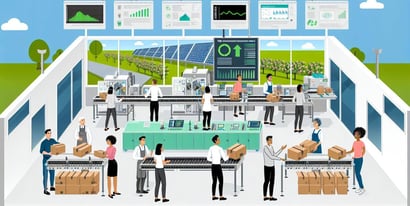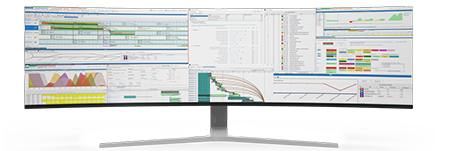Production Planning for Sustainability
With growing concerns about climate change, resource scarcity, and environmental regulations, businesses are under increasing pressure to adopt sustainable practices across their operations. Plant managers in packaging manufacturing facilities are no exception to this trend. They play a pivotal role in implementing sustainable production planning strategies that not only reduce environmental impact but also improve operational efficiency and profitability.
In this blog, we will explore the importance of production planning for sustainability and how integrating advanced planning and scheduling software like PlanetTogether with ERP, SCM, and MES systems can help packaging manufacturers achieve their sustainability goals.

Sustainable Production Planning
Sustainable production planning involves optimizing manufacturing processes to minimize negative environmental impacts while maximizing efficiency. It encompasses various aspects, including reducing waste, conserving energy and resources, minimizing emissions, and ensuring compliance with environmental regulations. Here are some compelling reasons why plant managers in packaging manufacturing facilities should prioritize sustainability in their production planning:
Environmental Responsibility
As responsible corporate citizens, manufacturers must reduce their carbon footprint and limit environmental degradation. Sustainable production planning aligns with this goal by minimizing resource consumption, waste generation, and pollution.
Cost Reduction
Sustainability initiatives often lead to cost savings. Efficient use of resources, reduced energy consumption, and waste reduction can translate into lower production costs and improved profitability.
Competitive Advantage
Consumers increasingly favor products from environmentally responsible companies. Sustainable production practices can enhance a company's brand reputation and market competitiveness.
Regulatory Compliance
Stringent environmental regulations are on the rise globally. Sustainable production planning ensures compliance with these regulations, avoiding potential fines and legal issues.
Supply Chain Resilience
Sustainability initiatives can enhance supply chain resilience by reducing dependency on finite resources and mitigating the risks associated with resource scarcity.

The Role of Integration in Sustainable Production Planning
Successful production planning for sustainability relies on real-time data, efficient communication, and seamless collaboration across various departments. Integration between different software systems is key to achieving these objectives.
Packaging manufacturers often use Enterprise Resource Planning (ERP), Supply Chain Management (SCM), and Manufacturing Execution Systems (MES) to manage their operations. Integrating these systems with advanced planning and scheduling software can unlock numerous benefits for sustainable production planning:
Real-time Data Accessibility
Integration enables real-time data sharing between different systems. This ensures that plant managers have access to up-to-date information on inventory levels, production schedules, and resource availability, allowing them to make informed decisions that reduce waste and optimize resource utilization.
Demand Forecasting
Advanced planning software like PlanetTogether can analyze historical data and market trends to provide accurate demand forecasts. This enables manufacturers to adjust production schedules accordingly, preventing overproduction and reducing waste.
Inventory Management
Integration with ERP systems helps in better inventory management. Plant managers can optimize inventory levels, reduce excess stock, and prevent obsolete materials from ending up in landfills.
Resource Optimization
Sustainable production planning involves using resources efficiently. Integrated systems allow for better resource allocation, minimizing energy and material waste.
Quality Control
MES integration ensures that quality control measures are integrated into the production process. This reduces the likelihood of defects and the need for rework, saving resources and minimizing waste.
Supply Chain Visibility
SCM integration enhances supply chain visibility, enabling plant managers to make informed decisions about sourcing materials locally, choosing eco-friendly suppliers, and optimizing transportation routes to reduce emissions.
Compliance Tracking
Integration ensures that sustainability and environmental compliance data are accurately tracked and reported, reducing the risk of non-compliance fines and penalties.


PlanetTogether: A Key Player in Sustainable Production Planning
Among the various advanced planning and scheduling software solutions available, PlanetTogether stands out as a powerful tool for plant managers in packaging manufacturing facilities looking to enhance their sustainability efforts. PlanetTogether offers features and capabilities that align with sustainable production planning principles:
Advanced Planning Algorithms
PlanetTogether employs advanced algorithms to optimize production schedules, taking into account resource constraints, demand fluctuations, and sustainability goals. This ensures that production plans are not only efficient but also eco-friendly.
What-If Analysis
Plant managers can simulate different production scenarios using PlanetTogether to identify the most sustainable and cost-effective options. This capability allows for informed decision-making that considers environmental impacts.
Integration Capabilities
PlanetTogether offers seamless integration with ERP, SCM, and MES systems. This integration ensures that data flows smoothly across the organization, facilitating better decision-making and sustainability initiatives.
Sustainability Metrics Tracking
The software allows users to track key sustainability metrics, such as energy consumption, emissions, and waste generation. This data can be used to set benchmarks and continuously improve environmental performance.
Reporting and Analytics
PlanetTogether provides robust reporting and analytics tools that help plant managers monitor progress towards sustainability goals and identify areas for improvement.
Implementing Sustainable Production Planning with PlanetTogether
To implement sustainable production planning effectively, plant managers should consider the following steps:
Assess Current Operations
Begin by conducting a comprehensive assessment of your packaging manufacturing facility's current operations. Identify areas where sustainability improvements can be made, such as energy usage, waste generation, and resource consumption.
Set Sustainability Goals
Establish clear sustainability goals and targets for your production processes. These goals should be specific, measurable, achievable, relevant, and time-bound (SMART).
Select the Right Technology
Choose advanced planning and scheduling software that aligns with your sustainability goals. PlanetTogether's integration capabilities make it an excellent choice for packaging manufacturers aiming to optimize their production processes while reducing their environmental footprint.
Collaborate and Train
Involve key stakeholders, including production teams, supply chain managers, and sustainability experts, in the planning process. Provide training to ensure that everyone understands the importance of sustainable production planning and how to use the software effectively.
Monitor and Improve
Regularly monitor and evaluate your progress towards sustainability goals. Use PlanetTogether's reporting and analytics tools to track key performance indicators and identify areas for improvement. Adjust your production plans and strategies accordingly.
Communicate Your Success
Share your sustainability achievements with customers, partners, and stakeholders. Transparency about your eco-friendly practices can enhance your company's reputation and marketability.
In the journey towards a greener future, sustainable production planning is no longer an option but a necessity for packaging manufacturing facilities. Plant managers have a crucial role to play in implementing strategies that reduce environmental impact while enhancing operational efficiency. Integrating advanced planning and scheduling software like PlanetTogether with ERP, SCM, and MES systems is a key step towards achieving sustainability goals.
By optimizing production schedules, reducing waste, conserving resources, and ensuring compliance with environmental regulations, packaging manufacturers can not only minimize their carbon footprint but also improve their bottom line. PlanetTogether's advanced capabilities and integration capabilities make it a valuable tool for plant managers looking to lead the way in sustainable production planning.
As we move forward, embracing sustainability in production planning will not only benefit the environment but also position your packaging manufacturing facility as a responsible and forward-thinking industry leader. It's time to take the first step towards a more sustainable and profitable future.
Are you ready to take your manufacturing operations to the next level? Contact us today to learn more about how PlanetTogether and integrated scheduling solutions can help you achieve your sustainability goals and drive success in the packaging industry.